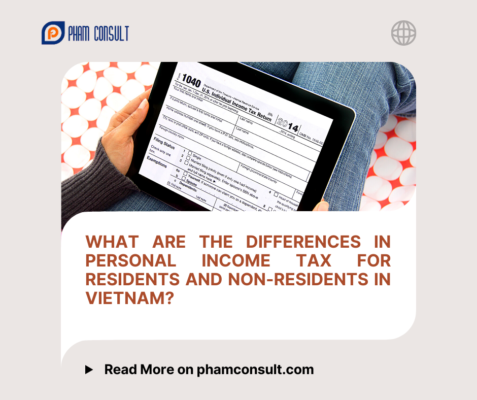Currently, both resident and non-resident individuals are subject to Personal Income Tax according to the provisions of the Personal Income Tax Law. However, the taxable scope and tax rates applied to these two subjects are completely different. Therefore, understanding how to determine resident and non-resident individuals according to current regulations is extremely important. Through today’s article, let’s learn more about this issue with Pham Consult!

What is a resident individual? What is a non-resident individual?
(1) Resident individuals:
Pursuant to Clause 1, Article 1 of Circular 111/2013/TT-BTC stipulates:
- A resident individual is a person who meets one of the following conditions:
- a) Being present in Vietnam for 183 days or more in a calendar year or 12 consecutive months from the first day of presence in Vietnam, in which the date of arrival and date of departure are counted as one (01) day . Arrival and departure dates are based on the certification of the immigration authority on the individual’s passport (or laissez-faire) when arriving and leaving Vietnam. In case of entry and exit on the same day, it is counted as one day of residence.
An individual’s presence in Vietnam according to the instructions at this point means that individual’s presence in the territory of Vietnam.
- b) Have a permanent residence in Vietnam in one of the following two cases:
b.1) Have a permanent residence according to the law on residence:
b.1.1) For Vietnamese citizens: permanent residence is the place where an individual lives regularly and stably for an indefinite period of time in a certain place and has registered permanent residence in accordance with the law on residence. residence.
b.1.2) For foreigners: permanent residence is the permanent residence stated in the Permanent Residence Card or temporary residence when applying for a Temporary Residence Card issued by a competent agency under the Ministry of Public Security.
b.2) Have a rented house to live in Vietnam according to the provisions of housing law, with a rental contract term of 183 days or more in the tax year, specifically as follows:
b.2.1) Individuals who do not have or do not have a permanent residence according to the instructions in point b.1, clause 1, this Article but have a total number of days of renting a house to stay under rental contracts of 183 days or more in the year calculated. Tax is also determined as a resident individual, including cases of renting houses in many places.
b.2.2) Houses rented for residential purposes include hotels, guest houses, motels, motels, workplaces, agency headquarters, etc., regardless of whether the individual rents it himself or not. Using hired labor for workers.
In case an individual has a permanent residence in Vietnam according to the provisions of this Clause but is actually present in Vietnam for less than 183 days in the tax year and the individual cannot prove which country he or she is a resident of, the individual That individual is an individual residing in Vietnam.
Proof of being a resident of another country is based on the Certificate of Residence. In case an individual belongs to a country or territory that has signed a Tax Agreement with Vietnam that does not have regulations on issuance of a Certificate of Residence, the individual must provide a copy of the Passport to prove the period of residence.
Accordingly, a resident individual is a person who meets one of the following conditions:
– Be present in Vietnam for 183 days or more in a calendar year or for 12 consecutive months from the first day of presence in Vietnam, of which:
+ Arrival and departure dates are counted as 1 day. In case of entry and exit on the same day, it is counted as one day of residence.
+ Arrival and departure dates are based on the certification of the immigration authority on the individual’s passport (or laissez-faire) when arriving and leaving Vietnam.
– Have a permanent residence in Vietnam according to the provisions above.
(2) Non-resident individuals:
A non-resident individual is an individual who does not meet the conditions of a resident individual.
Determining whether a person is a resident or a non-resident will have important impacts when determining the tax period and personal income tax rate of that individual.
How to differentiate personal income tax for resident and non-resident individuals in Vietnam?
Determining whether an individual is resident or non-resident is important in determining personal income tax from salaries and wages as follows:
| Criteria | Resident individual | Non-resident individual |
| Tax period | – Annual tax period: Applicable to income from business and income from salaries and wages.
– Tax period for each time income is generated: Applicable to income from capital investment, income from capital transfer, income from real estate transfer, income from winning prizes, income from copyrights , income from franchises, income from inheritance, income from gifts. – Tax period according to each time it arises or each year applicable to income from securities transfer |
– The tax period for non-resident individuals is calculated according to each time income is generated.
– In case a non-resident business individual has a fixed business location such as a store or stall, the tax period applies as for a resident individual with income from business. |
| Income taxes | Income arises within and outside the territory of Vietnam, regardless of where the income is paid | Only income arising in Vietnam, regardless of where income is paid and where income is received |
| Tax calculation basis for income from salaries and wages | – For resident individuals who have signed labor contracts of 3 months or more: Calculate personal income tax according to the partially progressive schedule.
– For resident individuals who do not sign a labor contract or have signed a labor contract for less than 3 months: Personal income tax = Total income x 10% Total income: income including salary and allowances of 02 million VND or more. |
Personal income = Taxable income x 20% |
| Compulsory insurance deduction/family circumstances | Deductible | No deductions are allowed |
| Tax deductions avoid double taxation | Deductible | No deductions are allowed |
How are personal income tax payers determined?
Pursuant to Article 2 of the Personal Income Tax Law 2007, regulations on personal income tax payers are as follows:
Taxpayers
- Personal income tax payers are resident individuals with taxable income specified in Article 3 of this Law arising within and outside the territory of Vietnam and non-resident individuals with taxable income specified in Article 3 of this Law arising within the territory of Vietnam.
- A resident individual is a person who meets one of the following conditions:
- a) Be present in Vietnam for 183 days or more in a calendar year or 12 consecutive months from the first day of presence in Vietnam;
- b) Have a permanent residence in Vietnam, including having a registered permanent residence or having a rented house to live in Vietnam under a term lease contract.
- Non-resident individual is a person who does not meet the conditions specified in Clause 2 of this Article.
Accordingly, specific regulations will be specified regarding tax collection and calculation. This information will supplement your work.




 VI
VI